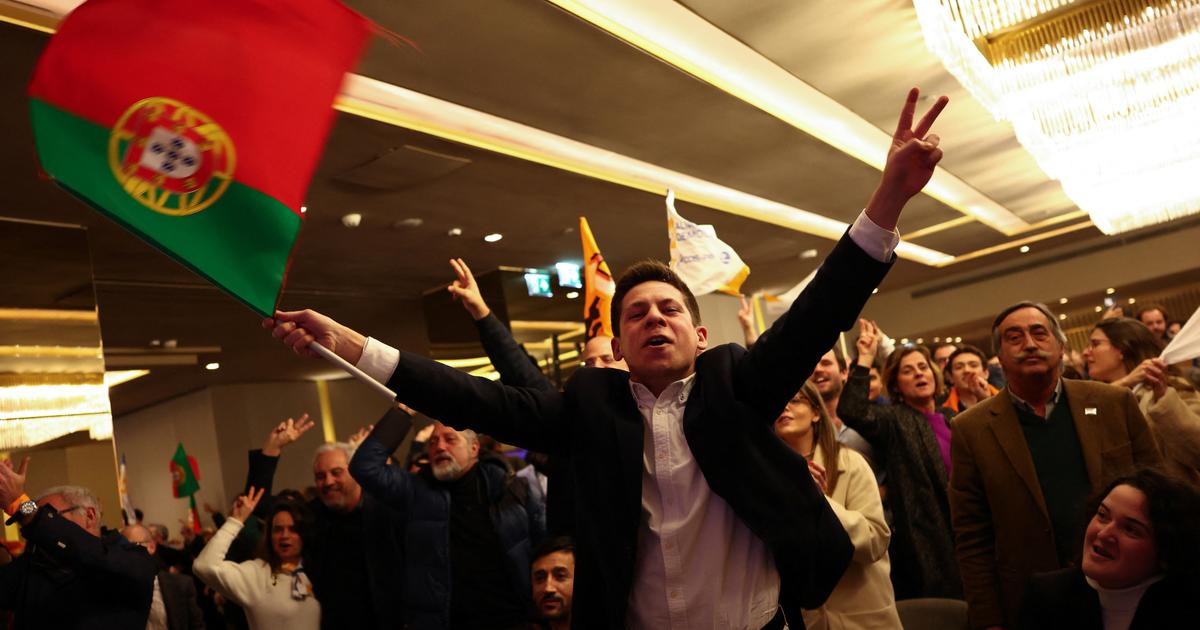Madrid,
Advantage to the Portuguese right and its leader, Luis Montenegro (Social Democratic Party, PSD) in the legislative elections this Sunday, according to the poll broadcast at 8 p.m. (9 p.m. in France) by public television RTP.
The survey grants the Democratic Alliance (AD) coalition between 29 and 33% of the votes and 83 to 91 deputies compared to 25 to 29% and between 69 and 77 seats for the outgoing Socialist Party (PS), led by the former minister Pedro Nuno Santos.
The far-right Chega (Enough!) group would obtain between 14 and 17% of the votes and 40 to 46 deputies.
According to these figures, the PS does not reach a majority by adding to its seats those obtained by the three parties to its left.
But the AD would not reach half of the seats (116 deputies), even adding the 7 to 10 elected representatives of Iniciativa liberal (IL).
The decisions that Chega, with which neither of the two major parties want to negotiate, and the ability of the latter two to come to an agreement, will therefore determine the political future of the country.
No negotiations with the far right
Several alliance scenarios are possible on paper, but one, central, has been excluded by Luis Montenegro.
With emphasis, the PSD candidate said it in three words: “
Não é não
” (“No, that’s no!”).
He will not enter into negotiations with Chega to seek the support of the far right for his inauguration.
The sentence pronounced last September is so terse that it prevents us from returning to it.
“
He would lose all his credibility
,” dismissed Riccardo Marchi, a specialist in the Portuguese far right and professor at the University of Lisbon, during the campaign.
Also read: How Portugal managed to restore its public finances
There remains the option that was usual in Portugal until 2015: among the two major parties which have alternated in power since the Carnation Revolution, the one that came second lets the first govern.
The unwritten rule was broken nine years ago by the formation of an unprecedented parliamentary alliance between the PS, arriving behind the PSD, the communists (CDU) and the radical left (Left Bloc, BE).
Until 2022, António Costa owed his position as Prime Minister to a plural left called “
geringonça
” (“tinkering or thing”).
Precarious stability
Professor of Political Science Antonio Costa Pinto recalls that Pedro Nuno Santos affirmed during the campaign his intention “
not to form a negative coalition with Chega to prevent a PSD government.
But in exchange he demanded Montenegro's commitment to making a PS government viable if the latter came first, which Montenegro did not take up
.
The political scientist ventures a prediction: “
The Portuguese want stability.
The PS has more interest in waiting, in letting Montenegro govern for a while rather than forcing the calling of new elections
.”
He adds that Chega would also have difficulty “
not letting a right-wing government pass and explaining it to its voters
”.
The fact remains that this scenario does not guarantee any stability to a right-wing government.
“
While the PS can forge alliances on its left and right, the PSD has only one option: count on the support of the PS.
This places the PSD in a very fragile situation, subject to the goodwill of the PS, a ruling party, which could bring it down at any time during the four years of legislature.
By refusing a priori discussions with Chega, Montenegro put his career at risk.”
The rise of Chega
The rise of the party founded in 2019 can be explained by several factors.
“
Chega’s mobilization capacity responds to three main issues
,” says Costa Pinto.
Corruption, or the perception of it by the Portuguese
[reinforced by Costa's resignation following a judicial investigation against five members of his cabinet, Editor's note]
;
promises of order and respect for the law;
immigration, which has been booming for five or six years, because the socialist government facilitated it, mainly to meet the demand for labor in the agri-food sector
.”
Without forgetting an inflection in the economic and social discourse of Chega, whose initial program was very liberal.
“
The evolution in three years is impressive.
Ventura took the liberty of asking the IL candidate:
“How can you afford to be liberal in a poor country?”
“
The increase in immigration has not caused major problems in Portugal
,” recognizes Marchi.
But there are neighborhoods whose population has changed significantly, and Chega can easily deliver a speech like
“We don't want to become like France, Belgium or Germany”.
The political scientist Costa Pinto, before knowing the results of the elections, commented on AD's success in the polls in these terms: “
After eight years of socialist government, a part of the centrist voters decided to give the right an opportunity
”.
To grab it, Luis Montenegro will have to take a narrow path.

